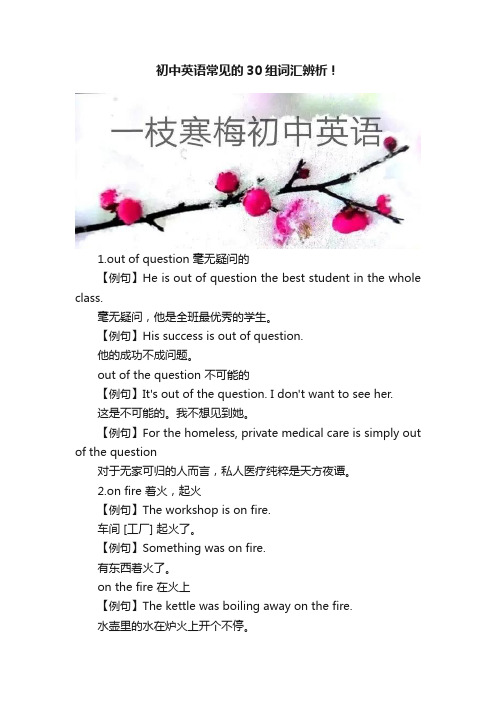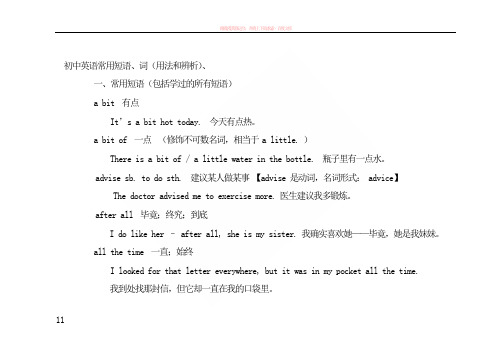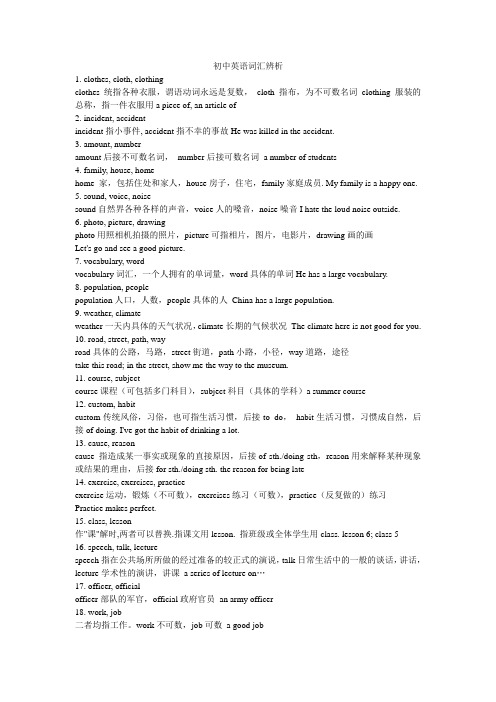初中英语必备常用词组辨析(31组)
英语词义辨析100组

英语词义辨析100组动词1. abandon desert discard quitabandon: 放弃,丢弃,抛弃。
指因为外界的压力或影响完全放弃,因迫不得已而放弃,如: abandon obligation 放弃任务。
desert: 抛弃,舍弃,指某人或某物在困境中“被抛弃”。
如: desert the baby after giving birth 生下婴儿后将其抛弃。
discard: 丢弃,抛弃(老朋友或旧物)。
如:discard one’s old friends 抛弃老朋友。
quit: 离开,退出,突然放弃。
指主动放弃或离开。
如: quit one’s job 辞职。
2. abolish cancel remove eliminateabolish: 废除,强调对法律或旧习惯的废除。
如: abolish slavery 废除奴隶制。
cancel: 取消,强调对原定的会议、计划、安排等取消。
如: cancel the meeting 取消会议。
remove: 出去,撤去。
强调位置的移动或从远处消失。
如: remove the stain from clothes 清除衣服上的污渍。
eliminate: 除去,剔除,淘汰。
强调使彻底消失。
如: eliminate sb. From competition 把某人淘汰出局,eliminate poverty 消除贫困3. abuse curse condemn criticizeabuse: 谩骂,辱骂;滥用,虐待。
指出口恶言骂人。
curse: 诅咒,咒骂。
表示愤怒或嫉恨。
condemn: 谴责,强调由于不良行为或过失而受到强烈谴责。
用于正式、严肃的场合。
criticize: 批评某人,强调指出某人的错误或不足之处。
4. accelerate speed hasten quickenaccelerate: 加速,既可指使物体加快速度运动,也可指使事情进程加快。
初中英语词汇词组辨析

56.quite ,very 很,十分1quite a +形容词+名词“一个相当……的……”quite a clever boy 一个相当聪明的男孩2a very+形容词+名词“一个非常……的”a very clever boy 一个非常聪明的男孩57.say,speak,talk,tell 说1say 后接说的内容,He says he likes English very much.2speak 后接语言,I can speak Japanese3talk “讨论,谈论”,可作动词也可作名词,talk about sth 谈论某件事,talk with /to sb 和某人谈话4tell ,“告诉,讲述”tell sb sth 告诉某人某件事,tell a story ,tell a lie 撒谎58.since, for 用于完成时态1since 后接时间点. Lucy has lived there since 1955. Lucy 自从1955年以来一直住在这里。
接“时间段+ago”I have been teaching since 10 years ago. 我教英语有10年了接“一般过去时态的句子”We have known each other since we were young.我们从小就认识。
2for 后接时间段。
We have studied for 9 years.我们学英语已经9年了。
59. so , such,如此,这样。
So /such ……that+否定句子=too……to+动词原形;so/such…+肯定句子=enough to+动词原形1so,修饰形容词或many,much,little,few(so good a boy 如此好的一个男孩(so much difficult 太多的困难He is so young that he can’t go to school=He is too young to go to school.他太小了,不能去上学。
英语常考近义词成语辨析100组

英语常考近义词成语辨析100组1. 喜欢 vs. 爱好 - 指对某一事物或活动的有好感或偏爱。
2. 开心 vs. 快乐 - 表示愉快的心情。
3. 困惑 vs. 迷惑 - 表示对某事情感到疑惑或莫名其妙。
4. 同情 vs. 同情心 - 表示对他人的困难或苦难感到理解和关切。
5. 感激 vs. 感谢 - 表示对别人的帮助或恩惠表示谢意。
6. 独特 vs. 特殊 - 表示与众不同或与常规不同。
7. 敏捷 vs. 灵活 - 表示动作或思维的迅捷程度。
8. 忠诚 vs. 诚实 - 表示对某人或某事的忠心和坦诚。
9. 本领 vs. 能力 - 表示某种技能或才能。
10. 合理 vs. 公正 - 表示合乎逻辑或公平正义。
11. 危险 vs. 风险 - 表示存在威胁或可能带来危险的情况。
12. 政府 vs. 政权 - 表示治理国家的机构或组织。
13. 友谊 vs. 友情 - 表示朋友之间的情感和关系。
14. 丰富 vs. 富裕 - 表示财富或资源充足。
15. 智慧 vs. 聪明 - 表示智力水平较高或思维敏捷。
16. 关注 vs. 关心 - 表示对某事物或某人的关注和关心。
17. 反对 vs. 抵制 - 表示不支持或反抗某一事物或行为。
18. 容易 vs. 简单 - 表示易于做到或理解。
19. 紧张 vs. 担忧 - 表示焦虑或担忧的情绪。
20. 信任 vs. 依赖 - 表示对某人或某事物的信心或依赖。
21. 目标 vs. 任务 - 表示需要完成的工作或目标。
22. 利益 vs. 好处 - 表示从某事物中获得的利益或好处。
23. 减少 vs. 缩小 - 表示数量或规模的减少。
24. 批评 vs. 指责 - 表示对某人或某事物的不满或责备。
25. 传统 vs. 习俗 - 表示某一群体传承下来的风俗或习惯。
26. 科学 vs. 学问 - 表示知识体系或某一学科的研究。
27. 知识 vs. 智慧 - 表示学习和了解的内容和能力。
初中英语重点短语辨析

初中英语重点短语辨析1. be made of / be made fromⅠ. be made of “由……制成/造”成品看得出原料。
如:The desk is made of wood. 这张桌子是木头制成的。
Ⅱ. be made from “由……制造/成”成品看不出原料。
如;Paper is made from rags.纸是由破布做的。
(已看不出原料)2. be pleased with/ at/ toⅠ. be pleased with “对……人/物,感到满意”介词with后接人或物。
如:① Both Mark and her mother were pleased with the girl. 马克和他妈妈都有喜欢这个女孩。
② I wasn’t very pleased with / at my exam results. 我对自己的考试成绩不太满意。
Ⅱ. be pleased at “对……某事/物,感到满意”。
介词at 常与事物搭配使用。
He was very pleased at the news.他对这个消息感到很满意。
Ⅲ. be pleased to “乐意……;因……而高兴”。
to 不是介词,而是小品词。
后接动词原形。
如:① I shall be pleased to go. 我将乐意去。
② We are quite pleased to be working in this country. 能在这个国家工作,我们是十分高兴的。
3. be sure of/ be sure to do/ be sure thatⅠ.be sure of “确信对……有把握”后接名词、代词或动词-ing 形式,表对客观事物有肯定的认识和判断,主语必须是人。
如:① As David joined our team, we are sure of winning the game this time.由于David参加了我们的球队,我们这次有把握取胜。
初中英语常见的30组词汇辨析!

初中英语常见的30组词汇辨析!1.out of question 毫无疑问的【例句】He is out of question the best student in the whole class.毫无疑问,他是全班最优秀的学生。
【例句】His success is out of question.他的成功不成问题。
out of the question 不可能的【例句】It's out of the question. I don't want to see her.这是不可能的。
我不想见到她。
【例句】For the homeless, private medical care is simply out of the question对于无家可归的人而言,私人医疗纯粹是天方夜谭。
2.on fire 着火,起火【例句】The workshop is on fire.车间 [工厂] 起火了。
【例句】Something was on fire.有东西着火了。
on the fire 在火上【例句】The kettle was boiling away on the fire.水壶里的水在炉火上开个不停。
【例句】Put another lump of coal on the fire.往炉火上再加放一块煤。
3.in office 在职的,执政的【例句】He had nothing tangible to show off three years in office.他为官三年,无实绩可言。
【例句】Which political party is in office in your country ?贵国是哪一个政党执政?in the office 在办公室里【例句】He was wanted in the office.有人在办公室找他。
【例句】Would you introduce me to others in the office?你能把我介绍给办公室的其他人吗?4.the doctor and teacher 指一个人,既是医生又是老师。
初中英语300组常用词语辨析完整版

初中英语300组常用词语辨析Lesson495.bloom/flower/blossomⅠ.bloom指观赏用的花。
如:玫瑰;菊花;牡丹等。
Ⅱ.flower是普通用语。
Ⅲ.blossom指果树上的花。
96.boat/shipⅠ.boat“船、艇,”是普通用语。
主要指用浆、篙、帆或引擎的小船、小艇,但有时也指大轮船。
如:1We crossed the river by boat.我们乘船过河。
2They pulled the boat up on to the shore.他们把这条船拖上了岸。
(指小船③When does the boat leave for Shanghai?(指轮船Ⅱ.ship“船、舰,”多指大的航海船只。
如:1The ship is at sea.船厂在航海。
2They went to Guangahou by ship.他们乘船去广州。
97.bold/brave/courageousⅠ.bold“大胆的、勇敢的”着重指大胆、勇敢的气质,表现出有胆量、敢闯或敢于对抗而不畏缩。
如:1Be bold!勇敢些!2It’s very bold of us to v enture to go to sea.我们冒险航海是很勇敢的。
Ⅱ.brave“勇敢的”,应用最广泛,通常指在危险、困难或可怕的情况下表现勇猛而畏缩。
如:1Be brave!勇敢些!2It was brave of him to enter the burning building.他敢进入那燃烧着的房屋,真是勇敢。
Ⅲ.courageous“勇敢的,无畏的”表示由于有勇敢的气质或不屈不挠的精神而能无畏地自觉地对付某种事情,常常用于表示道义上的勇敢。
如:1He is courageous in telling the truth.他敢于讲实话。
2We hope that they will courageously shoulder their responsibilities and overcome all difficulties.我们希望能够勇敢地负起责任,克服一切困难。
专为中考考生准备的初中英语常用短语、词语辨析

初中英语常用短语、词(用法和辨析)、一、常用短语(包括学过的所有短语)a bit 有点It’s a bit hot today. 今天有点热。
a bit of 一点(修饰不可数名词,相当于a little. )There is a bit of / a little water in the bottle. 瓶子里有一点水。
advise sb. to do sth. 建议某人做某事【advise 是动词,名词形式:advice】The doctor advised me to exercise more. 医生建议我多锻炼。
after all 毕竟;终究;到底I do like her – after all, she is my sister. 我确实喜欢她——毕竟,她是我妹妹。
all the time 一直;始终I looked for that letter everywhere, but it was in my pocket all the time.我到处找那封信,但它却一直在我的口袋里。
11and so on 等等Asas soon as 一……就……【由该短语引导的时间状语从句,需用一般现在时态表示将来时】I’ll call you as soon as I get there. 我一到那里就给你打电话。
as well (在口语中用得很多,用法和too 一样,两者可以互换,通常位于句末)I can do it as well. 我也能做这件事。
as well as 除……之外;并;和;也He gave me money as well as advice. 他除了给我中告外,还给了我钱。
ask for 请求;要①ask for +某人意思是:找某人,要求见某人Someone is asking for you at the door. 门口有人找你。
②ask for +某物意思是:要某物He wants to ask for some water. 他想要些水。
(完整)初中英语词汇辨析

初中英语词汇辨析1. clothes, cloth, clothingclothes统指各种衣服,谓语动词永远是复数,cloth指布,为不可数名词clothing 服装的总称,指一件衣服用a piece of, an article of2. incident, accidentincident指小事件, accident指不幸的事故He was killed in the accident.3. amount, numberamount后接不可数名词,number后接可数名词a number of students4. family, house, homehome 家,包括住处和家人,house房子,住宅,family家庭成员. My family is a happy one.5. sound, voice, noisesound自然界各种各样的声音,voice人的嗓音,noise噪音I hate the loud noise outside.6. photo, picture, drawingphoto用照相机拍摄的照片,picture可指相片,图片,电影片,drawing画的画Let's go and see a good picture.7. vocabulary, wordvocabulary词汇,一个人拥有的单词量,word具体的单词He has a large vocabulary.8. population, peoplepopulation人口,人数,people具体的人China has a large population.9. weather, climateweather一天内具体的天气状况,climate长期的气候状况The climate here is not good for you.10. road, street, path, wayroad具体的公路,马路,street街道,path小路,小径,way道路,途径take this road; in the street, show me the way to the museum.11. course, subjectcourse课程(可包括多门科目),subject科目(具体的学科)a summer course12. custom, habitcustom传统风俗,习俗,也可指生活习惯,后接to do,habit生活习惯,习惯成自然,后接of doing. I've got the habit of drinking a lot.13. cause, reasoncause 指造成某一事实或现象的直接原因,后接of sth./doing sth,reason用来解释某种现象或结果的理由,后接for sth./doing sth. the reason for being late14. exercise, exercises, practiceexercise运动,锻炼(不可数),exercises练习(可数),practice(反复做的)练习Practice makes perfect.15. class, lesson作"课"解时,两者可以替换.指课文用lesson. 指班级或全体学生用class. lesson 6; class 516. speech, talk, lecturespeech指在公共场所所做的经过准备的较正式的演说,talk日常生活中的一般的谈话,讲话,lecture学术性的演讲,讲课a series of lecture on…17. officer, officialofficer部队的军官,official政府官员an army officer18. work, job二者均指工作。
- 1、下载文档前请自行甄别文档内容的完整性,平台不提供额外的编辑、内容补充、找答案等附加服务。
- 2、"仅部分预览"的文档,不可在线预览部分如存在完整性等问题,可反馈申请退款(可完整预览的文档不适用该条件!)。
- 3、如文档侵犯您的权益,请联系客服反馈,我们会尽快为您处理(人工客服工作时间:9:00-18:30)。
初中英语常用词组辨析(31组)1、Look和See答:a. look一词单独用时,表示“看!”,通常要放在句首。
如:Look! There is a monkey in the tree. 看!树上有一只猴子。
b. look at表示要看具体的内容,如人或物。
如:Don’t look at me. Look at the blackboard, please.不要看我,请看黑板。
c. see表示看的结果,即“看到;看见”。
如:Can you see the words on the blackboard? 你能看见黑板上的字吗?see也用于“看电影”这个词组中,即:see a film2、Spend take paypay 的主语必须是人: (sb) pay money for sth. / pay sb.for sth.;spend的主语必须是人: (sb.) spend money/...for/on sth./ in doing sth. 在......方面花钱或精力;take表示做某事花费多少时间, 其主语一般是一件事 ; 有时也可以是人: It takes/ took sb. some time to do sth. 强调完成动作所花费的时间。
① It takes sb. some time to do sth.It took him half an hour to finish his homework.他花了半个小时完成家庭作业。
② sb. spends some time/money on sth./(in) doing sth.I spent thirty yuan on this book.我三十元买了这本书。
She spent ten minutes (in) getting there.她10分钟到达那儿。
③ sb. pays (some money) for sth.He paid a lot of money for the building.他买房子花了许多钱。
表“花费”的动词中,还有一个,即cost:cost 的主语必须是物或事: (sth.) cost(s) sb. money/life/health/time...;This coat cost me eighty yuan.这件上衣花了我80元。
3、on in atat介词at表时间、表地点。
(1)at表示时间,用于钟点前,用于时刻前,译为"在......时(刻)"。
如:at three/three o'clock 在三点。
at a quarter to six 六点差一刻。
at noon 在中午,at night 在夜晚, at midnight 在半夜at breakfast/lunch/supper 在吃早饭/午饭/晚饭时at this time of day 在每天这个时候(2)at表示地点,一般用于较小的地名(方)前,译为"在......"。
如:at home 在家,at the station 在车站(3)at表示处于......状态,译为"从事于......"。
如:at school 在上学,at work 在工作【相关链接】at加名词一般可与现在进行时态互换使用,表示正在进行的动作,试比较:They are at work./They are working.2.in小小介词in,用途却很多。
可表时间,表地点,表手段、方法、材料。
(1)in表示时间,用于泛指一天的上午、下午、晚上等;用于某个较长的时间,如年、月、季节等。
如:in the morning/afternoon/evening在上(下午)或晚上,in 2003在2003年,in the day/daytime 在白天【相关链接】in还可以表示"从现在起一段时间以后"。
如:They will see you in a week.他们将在一周后去看你。
另外,in和at都可以表示时间,但in表示较长的时间,而at表示时间的某一点。
例如:He got up late in the morning and had a meal at noon.他早上起得晚,所以只吃午餐。
(2)in表示地点、场所,译为"在......里"、"在......中"。
如:in the factory 在工厂,in the room 在房间里,in the sun 在阳光下,in the middle of...在......的中央【相关链接】in和at都可表示地点,而in表示的地点比at所表示的地点大。
(3)in表示用语言,用......材料。
译为"用......,以......方式"。
如:in English用英语,in ink 用墨水(4)in表示穿戴的状态,译为"戴着、穿着"。
如:in the white shirt穿着白色的衬衫,in the cap戴着帽子【相关链接】in表示"穿(戴)着"是介词,指状态,同wear一样。
in后接表示服装类的名词或表示颜色的词。
如:Kate is in a red skirt./Kate wears a red skirt.凯特穿着红裙子。
3.on介词on表示时间、地点、方位等。
(1)on表示时间,用于星期、日期(包括该天的各部分)。
如:on Sunday/Sundays,on Monday morning /afternoon/evening等。
on也用于某一日的名词前,用于公共节假日前。
如:On New Year's Day 在元旦,on Children's Day 在儿童节等。
(2)on表示地点、位置,有"在......旁"、"接近"、"靠近"之意。
如:a house on the main road 临大街的房子, sit on my right 坐在我的右边(3)on表示状态,译为"处于......情况中,从事于......"等。
如:on duty 值日,on holiday 度假(4)on表示"在......上面",用在表示物体的名词前。
如:on the box 在盒子上【相关链接】on和over都是介词,on表示"在......上面",指一物体与另一物体表面相接触;over表示"在......上方",指一物体与另一物体不接触。
试比较:There is a light on the desk.桌子上有盏台灯。
(light与desk接触)There is a light over the desk.桌子上方有一盏灯。
(light与desk不接触)【特别提示】表示"在......上",介词on与in必须注意习惯用法,否则会出错。
不妨比较一番:on the tree/in the tree都译为"......在树上"。
前者表示树上本身所长着的叶子、花、果实等;后者表示某物或某人在树上。
on the wall/in the wall都译为"在墙上"。
由于介词不同,在使用上有区别。
图画、黑板、风筝等"在墙上",是因为它们在墙的表面上,故用on the wall;门窗、钉子、洞、孔等"在墙上",是因为它们在墙的里面,故用in the wall。
4、clothes和clothingclothes泛指服装,包括上、下装,内、外衣clothing是衣着的总称,无复数形式,如:man''s clothing5、 a bit与a littlea bit和a littlea bit和a little都有“一点、少许”之意。
两进用作名词时,不能直接跟名词或代词,而必须用介of连接。
如:Well, Mrs Green, may be he has caught a bit of cold.There’s a little (=bit of) time left. 还剩一点儿时间。
She knows a bit (=little) of English. 她懂一点儿英语。
a bit 和a little也可用作副词,后面跟形容词或副词。
如:The jacket is a bit (=little) large. 这件夹克有点大。
That’s a bit expensive. Can I try them on, please?He ran a little faster than me. 他跑得比我快一点。
little还可用作形容词,表示“小的”、“几乎没有”。
如: a little girl(一个小姑娘)、 a little water(有一点水)注意:not a little 和not a bit的意思完全不同,前者是“许多、很”,后者是“一点儿也不”、“毫不”。
试对比:It’s not a bit cold. 天一点儿也不冷。
It’s not a little cold.天很冷。
6、everyday和every dayEveryday是形容词,意思是“日常用的”;every day“每天”是句词短语作状语。
例如:You must pay attention to your____English.A.every day’sB.everydayC.everyday’sD.every day7、have to和must首先,两者都可译为“应该”或“必须”,都是情态助动词,这是它们的共同之处;但在用法上有以下重要区别:⑴ have to表示客观条件决定不得不做某事语气较弱;must表示说话人主观的看法,语气较强。
例如:Do I have to say the words?我必须说这些话吗?You must work hard at English.你必须努力学习英语。
⑵must 只有一种形式,而have to有人称、数和时态的形式变化。
例如:She has to go to school earlier.她应当早一点儿上学。
(一般现在时,单数第三人称)I''ll have to write to him this evening.今晚我必须给他写信。
(一般将来时)He had to look after his sister yesterday.8、look,look at,see都是“看”的意思。
